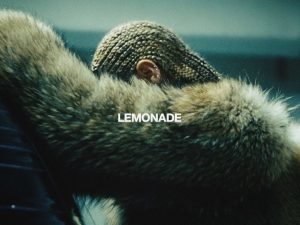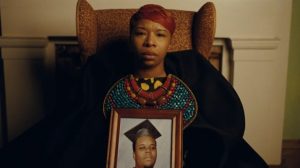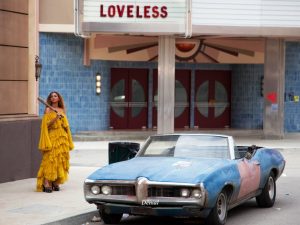Lemonade
By Anna Mae Nelson

“The most disrespected person in America is the black woman. The most unprotected person in America is the black woman. The most neglected person in America is the black woman.” – Malcolm X
Lemonade Summary
Lemonade is Beyoncé’s first ever visual album that was released in 2016. This sixty-five minute visual album has since left the country in awe at the powerful, upbringing film. The album is broken up into eleven different chapters: “Intuition,” “Denial,” “Anger,” “Apathy,” “Emptiness,” “Accountability,” “Reformation,” “Forgiveness,” “Resurrection,” “Hope,” and “Redemption,” that both tell and show a story. At first glance, the album seems to just be about the stages of grief, spanning from the first signs of her husband’s apparent infidelity all the way to forgiveness. But Lemonade is so much more than that. The album is an intersectional commentary on black life in America. Lemonade represents the black feminist tradition in ways that reclaim black southern culture, critiques stereotypical depictions of black women, and emphasizes community-wide activism against police brutality. The visual album empowers black women, celebrates southern culture, and references the Black Lives Matter movement.
Context for creation

Lemonade was released during a time of heightened racial injustices, and Lemonade brought the conversation and hope to many. These injustices are seen throughout the whole visual album, especially seen in the final chapter “Redemption” in the song “Formation.” This section begins with Beyoncé laying on a sinking New Orleans Police car in the aftermath of Hurricane Katrina. This terrible hurricane ravaged the southern United States more than 10 years ago. A large amount of the damage sustained and the recurring issues from the storm greatly affected poor, black communities. Beyoncé is showing that the government had forgotten about New Orleans after Hurricane Katrina and didn’t get the attention that it deserved because of the large black population, but she hadn’t forgotten.
Lemonade was also created after the beginning of the Black Lives Matter Movement, and has hints of the movement all throughout the album. During the time Lemonade was released, there were more and more unarmed police shootings that ended with young African-Americans not getting the justice that they deserved, and Beyoncé wanted to shed light on this issue. The song “Forward” features important black mothers who have lost their sons to police brutality. The powerful images of the mothers of Trayvon Martin, Eric Garner, and Michael Brown holding up pictures of their sons that were murdered made Beyoncé’s intention very clear. By putting these names so prominently on display, she is putting this movement in the faces of both supporters and those less willing to listen and continue to create discourse around Black Lives Matter.
Image of Michael Brown’s Mother
Feminist Aspects
Throughout the whole visual album, Beyoncé highlights many different aspects of feminism, too many to even count. But three of the most important feminist aspects that Beyoncé emphasizes are black hair, empowering body images, and breaking the stereotypes of female aggression. Throughout the whole album there are images of black women with their natural hair, as well as showcases of all the iconic hairstyles from decades past. For black women, their hair often plays a large role in their identity. This is due to the care and maintenance their hair requires, as well as the great cultural pride that many women associate with their hair. Society often associates ‘good hair’ as sleek and straight. This is not usually the natural hair of black women. An example of this is seen in the song, “Sorry.” A powerful lyrical verse says “You better call Becky with the good hair.”(Knowles-Carter, 2016). This verse implies that Becky is the woman that her husband is cheating with, but the phrase “with the good hair” suggests someone who is mixed race or white, which means her husband isn’t just betraying her, but betraying her as a black woman. A black feminist view on the discussion of women’s hair comes down to the question of why do women have to completely change the natural pattern of growth of their hair in order to be accepted by society.
 Another powerful visual component of the song “Sorry” is the guest appearance of Serena Williams, an olympic athlete who has been excoriated for her body in the past. Williams is featured twerking during the lyrics “middle fingers up” to break the stereotypes that perfect women should be skinny, overly feminine, and white. Beyoncé used Williams as a “f-you” to everyone who believes that beautiful female bodies do not look like hers. Society doesn’t like that Williams, or all women for that matter, is a beautiful woman as well as an amazing athlete. Beyoncé is highlighting the double burden that is placed on the shoulders of black women when it comes to beauty and femininity.
Another powerful visual component of the song “Sorry” is the guest appearance of Serena Williams, an olympic athlete who has been excoriated for her body in the past. Williams is featured twerking during the lyrics “middle fingers up” to break the stereotypes that perfect women should be skinny, overly feminine, and white. Beyoncé used Williams as a “f-you” to everyone who believes that beautiful female bodies do not look like hers. Society doesn’t like that Williams, or all women for that matter, is a beautiful woman as well as an amazing athlete. Beyoncé is highlighting the double burden that is placed on the shoulders of black women when it comes to beauty and femininity.
Finally, Beyoncé addresses head-on the damaging stereotype around all black women being “angry black women.” But in reality she is portraying the image of a powerful woman as being a good thing. She addresses a powerful woman, which is defined in patriarchal society as a ‘bitch’, as a characteristic to help women overcome their hard times. For example, Beyoncé is able to overcome and express her emotions about her husband’s suspected infidelity as being a powerful independent woman, which is seen everywhere throughout Lemonade. In the second song of the visual album, “Hold up”, Beyoncé is destroying cars and fire hydrants. These powerful visuals help Beyoncé show it’s okay for women to have powerful emotions , and it does not make them weak or vulnerable. 
Similar Texts
Hair Love | Oscar®-Winning Short Film (Full …
Beyoncé’s Lemonade runs parallels to many other feminist texts and media, Hair Love being one of them. Hair Love follows the large role hair plays in black women’s lives and tries to teach people of color to love their hair. This Oscar winning short film follows the story of an African-American Father and his daughter as they attempt to tackle styling the girl’s hair before visiting her mother, who is sick. The film is heartbreaking, yet empowering and is bursting with pride about family, culture and black hair.
Cottom, Tressie McMillan. Thick: and Other Essays. The New Press, 2019.
Another text that runs parallels to Lemonade is the book Thick by Tressie McMillan Cottom. This collection of essays is a showing of how the American society views and treats black women. The main concept in this book is the idea of “thinking thickly.” In today’s culture, the word “thick” is often referring to a woman’s body, specifically a black woman’s body. This essay is taking that word and concept and applying it to how we should be critically thinking. When someone thinks “thickly,” they are making sure to think in a way that is intersectional and encompassing of many different things. This way of thinking is the base of black feminism.
Terms to know
Feminism – Advocacy of women’s rights
Intersectionality – Framework to understanding how all aspects of identity come together
Patriarchy – System of society in which men hold the power
Stereotype – A commonly held, often oversimplified view of a specific person/people
Black Lives Matter Movement – learn more https://blacklivesmatter.com
Additional Resources
Works Cited
Cherry, Matthew A. “Hair Love.” Matthew A. Cherry, www.matthewacherry.com/hair-love.
Cottom, Tressie McMillan. Thick: and Other Essays. The New Press, 2019.
Knowles-Carter, B. (Producer). (2016). Lemonade [Motion picture]. United States: The Beehive